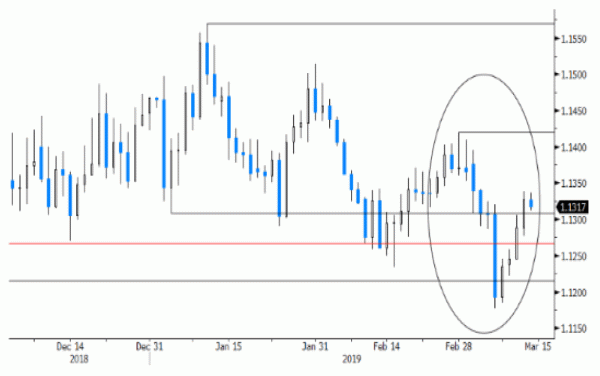Rates: Investors start eyeing Fed meeting
Today’s eco calendar won’t inspire bond trading even if this week’s final brexit vote is a wildcard. Investors start eyeing next week’s FOMC meeting. The Fed is expected to lower its plotted rate hikes from 3 to maximum 1 while announcing the end of the balance sheet run-off by the end of this year. That should keep long term yields under downward pressure.
Currencies: EUR/USD rebound to slow?
EUR/USD rebounded further on USD softness yesterday, ahead next week’s Fed meeting and as the euro profited from the UK excluding a no deal Brexit. This morning sentiment on risk eases in Asia and the avoidance of a no deal Brexit should be discounted. Time for the euro rally to take a breather? Quite some good news on Brexit is also discounted in sterling.
The Sunrise Headlines
- US equity markets edged higher yesterday with gains up to 0.69% (S&P500 and Nasdaq). Asian equities are trading mixed this morning with Chinese indices underperforming on weak data and Trump’s trade deal warning.
- UK Parliament has rejected to leave the EU without a deal. Though the parliamentary decision is not legally binding, it is political indicative. MP’s will today vote on a postponement to the current March 29 deadline.
- US President Trump confirmed that trade negotiations with China are going very well, but that he is in no rush to complete a deal. He said he wants “the right deal”, including protection for intellectual property.
- The UK RICS monthly house price balance dropped to lowest level since May 2011 in February (-28 from -22). The brexit uncertainty has a major impact on the US housing market.
- Oil prices rose to their highest level since November last year as US crude stockpiles declined 3.9 million barrels last week and concerns on global growth continue. A barrel of Brent crude oil is currently trading at $67.8.
- China’s economic slowdown deepened in the first two months of the year, as industrial production grew slower in February (5.3% YTD, Y/Y), down from 6.2%. Retail sales increased with 8.2% (YTD, Y/Y), down from 9.0% a year earlier.
- Today’s US eco calendar contains this week’s jobless claims and January new home sales. France and Germany print final readings of February consumer inflation results. The UK taps the market
Currencies: EUR/USD Rebound To Slow?
EUR/USD rebound to slow?
The EUR/USD rebound from earlier this week continued yesterday. It was mainly technical in nature, but was also supported by a constructive risk sentiment. Eco data were second tier but pointed in the same direction. EMU production was OK. US data (PPI and durable) were mixed but no reason for the Fed to change its wait-and-see attitude next week. Later, the UK Parliament excluding a no-deal Brexit ever supported sterling and the euro, weighing on the dollar. EUR/USD close at 1.1327. Some kind of by default USD selling also filtered through into the USD/JPY cross rate. The pair closed at 111.17, despite the risk-on. Overnight, Asian equities are trading mixed. Recent risk-on is fading. China underperforms on poor February production data, indicating a further slowdown in the sector. Negative headlines from China are weighing on the Aussie (AUD/USD 0.7060) and the Kiwi dollar (NZD/USD 0.6840 area). Interestingly, USD/JPY (111.55) is revising yesterday’s setback. EUR/USD (1.1320 area) eases slightly (GBP-driven). Today, there are only second tier eco data in EMU. US data (import prices, jobless claims and new home sales) are probably also only of intraday significance for FX trading. Recent risk-on sentiment (partially supported by cautious/soft market expectations on next week’s Fed meeting) supported the euro. Next week’s Fed meeting remains in FX-traders’ minds, but the risk rally is losing momentum at least in Asia this morning. The positive impact for euro of the UK parliament rejecting a no-deal Brexit might be discounted and visibility on next steps in Brexit sage remain highly uncertain. We don’t expect a big dollar comeback going into next week’s Fed meeting, but further EUR/USD gains might become less evident in a daily perspective. This week, post-ECB euro negativism eased and the EUR/USD 1.12 range bottom become more solid. Still, the euro has little prospect on interest rate support. But better EMU data might moderate the euro negative sentiment. ST, we see EUR/USD consolidation in the 1.12/1.14 area.
Yesterday, it was all counting down to the next key Brexit-vote in the UK Parliament for sterling traders. It was in the cards that a no-deal Brexit on 29 March would be rejected, but Parliament even voted against no deal also further out. This was seen reinforcing the case for a soft or even no Brexit at all. EUR/GBP dropped top to the 0.85 area. However, with political uncertainty growing rather than declining, we are still not inclined to a front-run on possible further Brexit-related GBP-gains from current levels. Overnight, the RICS house price balance declined again more than expected
EUR/USD: rebounds from 1.12 range bottom, partially on USD softness. Rally to slow?

